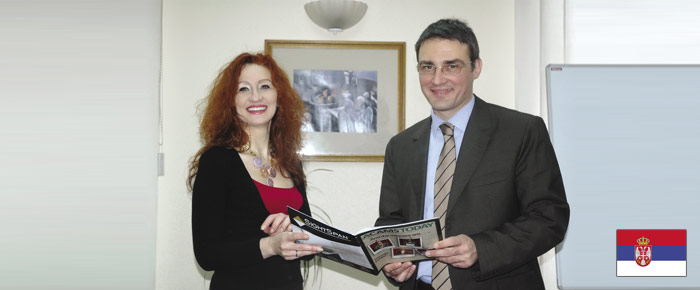
In Serbia there are more and more final verdicts against money launderers. A new system has been established making Serbia the first country in Europe to start the process of a national risk assessment of money laundering. In this interview, Aleksandar Vujicic, Director of the Administration for the Prevention of Money Laundering (APML) of the Ministry of Finance Republic of Serbia, discusses this new process being implemented to fight money laundering, strengthen the system and assist law enforcement.
In the centre of Belgrade, near the corner of two very busy streets in a busy shopping zone where buildings, palaces, window displays and advertisements compete against each other to be the most visible and the most memorable, there is a rather small and very famous street where all buildings seem to be visible at first glance. This is where the APML is located. To my surprise, I had to look for the APML's building because from the street the building couldn't be seen.
Arriving at the APML, reminded me of the best movies about intelligence units on special assignments. There was a hint of mystery in the atmosphere. Despite that, my interview with Aleksandar Vujicic was dominated by openness.
Interviewer: How was the APML formed and what is its role?
Mr. Vujicic: The APML is the financial intelligence unit of the Republic of Serbia. It is an independent body within the Ministry of Finance. The jurisdiction of APML is prescribed by law. According to this law, reports about all suspicious financial transactions and persons should be sent to the APML. The APML analyzes the reports and collects additional information. If there is reasonable suspicion about money laundering or terrorist financing, the information will be forwarded to the competent authorities, relevant prosecutors and police. Even without a previous suspicious transaction report, the APML can reasonably suspect, while carrying out its own analyses, that a person or an organized group launders money or participates in the financing of terrorism. The APML then can require additional information from appropriate reporting entities like banks, insurance companies, dealers, brokers, accountants, entrepreneurs, or legal persons engaged in factoring and forfeiting.
The APML may also initiate proceedings to collect and analyze data upon a request from another state body such as the courts, prosecutors, the Security Information Agency, the Privatisation Agency, the Securities Commission, police and other organizations.
The APML plays the role of the coordinator of all other state bodies participating in the fight against money laundering, including law enforcement and supervisory authorities that control the application of the Act, the police, prosecutors and courts that are participants of the repressive segment of the anti-money laundering system because they prosecute offenders. The APML plays a central role in the AML system. It is responsible for proposing all legislation in the field of prevention of money laundering and thus ensures that statutory provisions are in accordance with international standards, and is responsible for proper application of law and creating of conditions that will prevent money laundering through the economy of our country. On the other hand, the APML has a role in detecting money laundering and in cooperation with police and prosecutors to participate in gathering evidence against those who launder money,
Interviewer: Explain the position of Serbia in the region and in the world when it comes to combating money laundering:
Mr. Vujicic: We may notice the similarity between the established systems in neighbouring countries. The similarity comes from the fact that we are all obliged to apply the same international standards, and we have similar legal systems as the basis for the implementation of those standards. When it comes to FIU organization, almost all countries in the region have administrative-type FIUs, which have proven to be a very good model for a successful operation of this type of FIU, especially for their successful collaboration with the private sector. We have very good cooperation with neighbouring countries, especially with the countries of former Yugoslavia, where the absence of language barriers and proximity are in favour of potential launderers. The importance of successful international cooperation has been recognized by the states of former Yugoslavia and Albania, which signed The Protocol of Cooperation in 2004. According to [the Protocol], at least once a year all countries in the region hold operational meetings of the heads of the FIUs. Serbia hosted the event in 2010, and Slovenia did so last year.
Interviewer: Compare the social situation in this segment today to that of ten years ago?
Mr. Vujicic: Ten years ago money laundering was criminalized for the first time in Serbia and the system began its development. In the last five years the situation has changed dramatically: Three years ago we had only one final verdict when it came to money laundering. In 2010, there were 19 final judgments. The structure of the previous (predicate) offences has also changed. Until recently, only tax evasion appeared as a predicate crime in money laundering cases, but today it is mostly organized crime. I consider the reform in the jurisdiction of courts and prosecutors contributed to this positive development. Since the beginning of 2010, jurisdiction for prosecuting money launderers has moved from basic courts to higher courts and prosecutors. Also, much has been done on the education level of all of the system's parts and the awareness of the whole society about the need to combat these phenomena has increased.
Interviewer: Systemic corruption is not a favourable framework for combating of money laundering. According to data, acts of corruption constitute predicate crimes in roughly one in five cases that the APML deals with. The APML does not have any investigative power. Is that changing?
Mr. Vujicic: Recently an anti-corruption agency has been established and its responsibilities include preventing corruption and establishing the system for combating corruption. However, we should note that there is a difference between money laundering and corruption. Corruption offences are only one area of our focus for predicate offences. For example crimes which generate criminal proceeds will be subject to laundering, the Serbian AML system has the so-called all-crimes approach in money laundering. In other words, any criminal offence which may generate proceeds is considered a predicate crime for money laundering.
Interviewer: What is the opinion of the European Union when it comes to AML in Serbia?
Mr. Vujicic: The system for the prevention of money laundering was subject to a detailed evaluation by the Council of Europe's MoneyVal Committee in December 2009. The Committee adopted the report on the on-site evaluation it conducted (available: www.coe.int/t/dghl/monitoring/moneyval/countries/Serbia_en.asp). According to the MoneyVal report, the AML/CFT system in Serbia is mostly in accordance with FATF recommendations and the relevant EU standards. The general assessment is that Serbia has made great progress in the last four years.
Interviewer: What are your greatest achievements?
Mr. Vujicic: A well-functioning system has been established, which has resulted in a larger number of convictions and indictments for money laundering. This is also due to the APML's accomplishments because it coordinates activities of many state authorities in the fight against money laundering. A financial intelligence unit such as ours provides guidance for further AML system development in many modern countries, as an FIU knows the best international AML standards and trends.
Recently, a process of a comprehensive national assessment (NRA) of the risk of money laundering in Serbia has begun. Experts from various fields will gather relevant information from all sectors, analyze it and make a conclusion about the degree of risk of each sector. In this way, it will be decided on the implementation of adequate resources to reduce that risk. The APML is the leading institution in this work and serves as coordinator of all state bodies which will result in conclusions that will serve as a basis for a new national AML/CFT strategy to cover the next three to five years. Serbia is the first country in Europe which has begun the process of national risk assessment, and we are very glad that the countries of Southeastern Europe have expressed a desire to use our experience with a view to creating an effective NRA process in their countries.
Interviewer: What are your goals for the future?
Mr. Vujicic: The goal of the APML is to ensure the functioning of the entire system, both preventive and repressive by creating unfavourable conditions for money laundering. If the preventive part of the system does not fulfill its role in an individual case, it is necessary to adequately punish criminals and confiscate their property. In this way general prevention will be achieved and potential offenders deterred from commission of crimes. In addition, we are planning to open a training centre that will serve for the training of employees of the APML, private sector, prosecutors' offices and courts, of foreign financial intelligence units, and law enforcement agencies.
Interviewer: How will you achieve these goals?
Mr. Vujicic: There is a legal framework in place that is harmonised with international standards and it now remains for all participants to apply the regulations properly. The APML continually works to raise awareness of all participants in the system by delivering training both for the reporting entities and for the prosecutors, police and judiciary. The institutional strengthening of all participants in the system, encouraging their daily and close working cooperation, along with providing constant training and education about the money laundering methods and trends, is the key to a successful fight against this crime. We get great support for achieving the goals through the Project against Money Laundering and Terrorist Financing in Serbia (MOLI Serbia), which serves to strengthen the capacity not only of the APML, but of the other state authorities who participate in the fight against money laundering and terrorist financing.
Interviewer: Are you satisfied with the international cooperation?
Mr. Vujicic: We have already mentioned the MOLI Serbia Project which is worth 2.2 million Euros, and includes a series of activities to strengthen the capacities of the APML as well as of other state bodies participating in combating of money laundering. The project will improve the software solutions that already exist in the APML.
International cooperation is very important when we talk about specific cases of money laundering. In almost all cases that we deal with we request information from our colleagues in other countries. The Egmont Group, an association of financial intelligence units of 127 countries, has a great importance. By sharing information through a secure website of the Egmont Group, we can quickly get the information about whether someone has opened an account in another state, the amount of funds on the account, and the performance of transactions. These data help prosecutors in the investigation.
Through the participation in international seminars, experts exchange experiences and best practices, we get information on typologies and trends in money laundering, and compliance professionals get an idea of what could be done better in their own country.
During the last year, with the support of OSCE (Organization for Security and Co-operation in Europe), the project of writing the typologies of money laundering in the Republic of Serbia was made. Seven experts for different fields, employed at the APML, developed money laundering typologies classified by the reporting entities (money laundering through exchange operations, banking products, insurance, capital markets, etc.) and money laundering trends for which our experts believe could be expected to be used in an attempt to place dirty money into legal channels. The goal of the project is to assist conscientious reporting entities to identify money laundering vulnerabilities.
The APML made a number of other successful projects in cooperation with United States Agency for International Development (USAID) and United Nations Office on Drugs and Crime (UNODC).
Interviewer: In your opinion, what type of international help is needed?
Mr. Vujicic: Investment in education of all entities in the AML system and at different levels. First of all, we need to invest in training employees in the APML because they are at the forefront of the fight against money laundering. Knowledge in the area of financial forensics, capital markets, new technological advances, e-money etc. The ways dirty money is entering into legal channels is constantly changing and money launderers are using the lack of a system or new products that are still not well known. Training of the police, prosecutors, and courts is of key importance because they are the final link in the chain of crime fighting. Ways of collecting evidence, special investigations and prosecutorial investigations are areas where constant improvement is necessary. In this fight, it is necessary to get assistance. Exchange of experiences, exchange of good practices and bringing experts from countries that are successful in this area is also needed.
Interviewer: What is the educational profile of AML specialists in Serbia?
Mr. Vujicic: The employees of the APML are experts in law, economics and information technologies. Young people who come to work in the APML undergo specialized training. Courses are related to the use of specialized tools for analysis, intelligence analysis, as well as training for work in analytical software. Training is also related to the method of application of international standards, strategic analysis and other areas. When it comes to compliance officers in the reporting entities, there are several conditions that must be fulfilled. They must not be convicted of criminal acts and there must not be criminal proceedings against them. They must have knowledge about prevention of money laundering and terrorist financing. The APML issues the license for compliance officers. The licence is issued after the applicant passes a professional examination in which knowledge is tested regarding relevant regulations and specific skills and knowledge in a particular area in which the candidate wants to work.
One of the factors making our work more difficult seems to be a general lack of understanding of the significance and role of the APML for the prevention of money laundering, where its experts are considered mere civil servants. It is not easy to motivate people in such circumstances, and it is one of the challenges we constantly face.
In the banking sector, the situation is changing. The management of banks has become aware that compliance officers who constitute the "non-profit-making" bank department are still working to preserve the reputation of the bank and reduce the risk of tarnishing its reputation. The introduction of licenses for compliance officers, which certify that they possess relevant knowledge and skills, has contributed to improving the position of compliance officers.
Interviewer: What are the biggest challenges in this business for you?
Mr. Vujicic: Money laundering is a very dynamic area. The biggest challenge is the need to adapt to new trends and typologies as well as hard work and continuous improvement. Every success in this business is a great satisfaction.
The modern world is a global village and we all depend on each other because it is necessary that all countries apply the international regulations and the international community should insist on it. It takes even more work to raise awareness among people who make the decisions on how huge the hidden danger in money laundering is. Removing these barriers is the way to achieve goals. The biggest obstacles are the greatest challenges.










